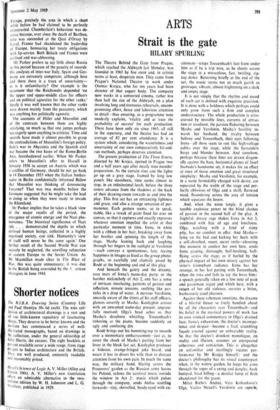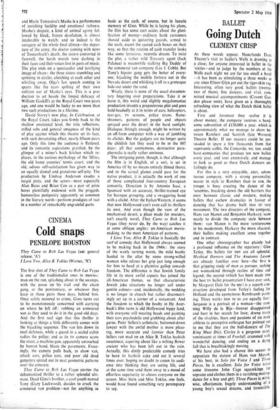Strait is the gate ARTS
HILARY SPURLING
The Theatre Behind the Gate from Prague, which reached the Aldwych last Monday, was founded in 1965 by five stern and, in artistic terms at least, desperate men. They came from Prague's National Theatre to work under
Otomar Krejca, who for ten years had been director of that august body. The company now works in a converted cinema, rather less than half the size of the Aldwych, on a plan involving long and strenuous rehearsals, uncom- promising effort, fierce and laborious attention to detail—thus ensuring, as a programme note modestly explains, 'vitality and at least the probability of success' for each production. There have been only six since 1965, all still in the repertory, and the theatre has had an average of 82 per cent attendance. It is a system which, considering the wastefulness and uncertainty of our own comparatively hit-and- run methods, perhaps deserves attention.
The present production of The Three Sisters, directed by Mr Krejca, opened in Prague two and a half years ago after nearly nine months' preparation. As the curtain rises and the lights- go up on a grey stage, framed by long low panels like dustsheets, time seems almost to stop, in an infinitesimal lurch, before the three sisters advance from the shadows at the back of their drawing-room towards us and into the play. This first act has an entrancing lightness and grace, and also a strange sensation of per- manence. Each gesture seems, so to speak, stable, like a streak of paint fixed for ever on canvas, so that it captures and exactly expresses whatever emotion impelled the artist at that particular moment in time. Irena, in white with a ribbon in her hair, breaking away from her brother and spinning the length of the stage, Masha leaning back and laughing through her fingers in the sunlight at Vershinin —each conveys a spontaneous, lazy, teasing happiness in images as fixed as the group photo- graphs, so carefully and clumsily posed by Rode at the beginning and end of this play.
And beneath the gaiety and the dreamy, easy tears of Irena's name-day party, or the harsher melancholy of Act 2, one has a. sense of intricate interlacing, patterns of gesture and inflection, minute tensions, seething like par- ticles in a drop of water. A nervous Vershinin, uneasily aware of the titters of his staff officers, glances covertly at Masha; Koolyghin arrives with an unwanted name-day present, ungrate- fully received; Olga's head aches so that Masha's desultory whistling, Toozenbach's tinkering at the piano, become suddenly an ugly and confusing din.
Rode brings out his humming-top to smooth over a momentary embarrassment—just as, to cover the shock of Masha's parting from her lover in the bleak last act, Koolyghin produces a hideous, orange-fringed joke beard, and wears it less to divert his wife than to distract attention from his own pain. In. much the same way, the military band, blaring across the Prozorovs' garden as the Russian army leaves for Poland, echoes the carnival music outside the window in Act 2: music which pulses through the company, sends Anfisa scuttling forwards—tiny, shrivelled, beady-eyed with ex-
citement—whips Toozenbach's feet from under him as if by a trip wire, as he shoots across the stage in a miraculous, fast, twirling, zig- zag dance. Returning briefly at the end of-the act, the music seems not so much garish as grotesque, vibrant, almost frightening on a dark and empty stage. • It is not simply that the rhythm and mood of each act is defined with exquisite precision.
It is done with a boldness which perhaps could only grow from such a firm and complex understructure. The whole production is criss- crossed by invisible lines, currents of attrac- tion or revulsion, the passion flickering between
Masha and Vershinin, Masha's hostility to- • wards her husband, the rivalry between Soliony and Toozenbach, their eyes following Irena—all these seem to run like high-voltage cables over the stage, while the bystanders barge and blunder between. And somehow, perhaps because these lines are drawn diagon- ally against the bare, horizontal planes of Josef Svoboda's handsome set, it makes for an effect at once of fierce emotion and great structural simplicity : Masha and Vershinin, for example, in a scene formidably charged with desire, are separated by the width of the stage and per- fectly oblivious of Olga and a shrill, flustered maid, floundering across the area of tension which separates the lovers.
And, when the wites tangle, it gives a terrible explosive power to the blind clashes of passion in the second half of the play. A frightful, dreary rage shakes Irena in Act 3, combined with fear of age and loneliness. Olga, watching with a kind of stony pity, has no comfort to offer. And Masha- lying on the bed and kicking her heels with a self-absorbed, sweet, secret smile—choosing this moment to confess her own love, sends Irena gasping, distraught, half-lurching, half- flying across the stage, as if hurled by the physical impact of her own misery against her sister's triumphant radiance. Irena has het revenge, in her last parting with Toozenbach, when she tries and fails to say she loves him: a speech generally taken on a low note of pain and passionate regret and which here, with a return of her old violence, secretes a bitter, barbarously cruel pleasure.
Against these vehement emotions, the dreams of a blissful future so freely bandied about by all the characters save Toozenbach—and his belief in the mystical powers of work has its own ironical commentary in Olga's drained face, lrena's exhaustion, the doctor's incompe- tence and despair—become a frail, crumbling facade erected against an unbearable reality. So that the doctor's drunken monologue, on reality and illusion, assumes an unexpected coherence and conviction. This is altogether an unfamiliar and startlingly vicious per- formance by Mr Krejca himself: and the doctor's philosophy has its visual counterpart when, in the wintry garden, he loops his arms through the ropes of a swing and dangles, back humped, head lolling—a derelict lump of flesh abandoned for the grave.
Milan Riehs's Andrei, Vera Kubankova's Olga, Vaclav Neuzil's Vershinin are superb; and Marie Tomasova's Masha is a performance of ravishing lucidity and emotional richness. Masha's despair, a kind of animal agony fol- lowed by bleak, frozen desolation, is almost intolerable to watch; and so indeed is the savagery of the whole final climax—the depar- ture of the army, the doctor coming with news of Toozenbach's death, the sisters contorted in farewell, the harsh march tune dashing in their faces and their voices lost in gusts of music. The play ends on a spectacular and terrifying image of chaos: the three sisters stumbling and spinning in circles, clutching at each other and whirling away, Olga's last speech coming in spurts like the tears spilling of their own volition out of Masha's eyes. This is a pro- duction to set beside the limpid delicacy of William Gaskill's at the Royal Court two years ago, and one would be lucky to see more than two such productions in a lifetime.
- David Storey's new play, In Celebration, at the Royal Court, takes you firmly back to the shallow emotional level, the trite reflections, stifled sobs and general smugness of the kind of play against which this theatre set its face, with such devastating effect, nearly fifteen years ago. Only this time the audience is flattered, and its romantic aspirations gratified, by the glimpse of a miner's back kitchen which re- places, in the curious mythology of the 'fifties, the old home counties' tennis court; and the old, odious self-satisfaction has given way to an equally dismal and gratuitous self-pity. The production by Lindsay Anderson exudes a turgid piety, and the actors—most especially Alan Bates and Brian Cox as a pair of prize bores plentifully endowed with the priggish, humourless pomposity apparently so common in the literary north—perform prodigies of tact in a number of remarkably ungrateful parts.



































 Previous page
Previous page